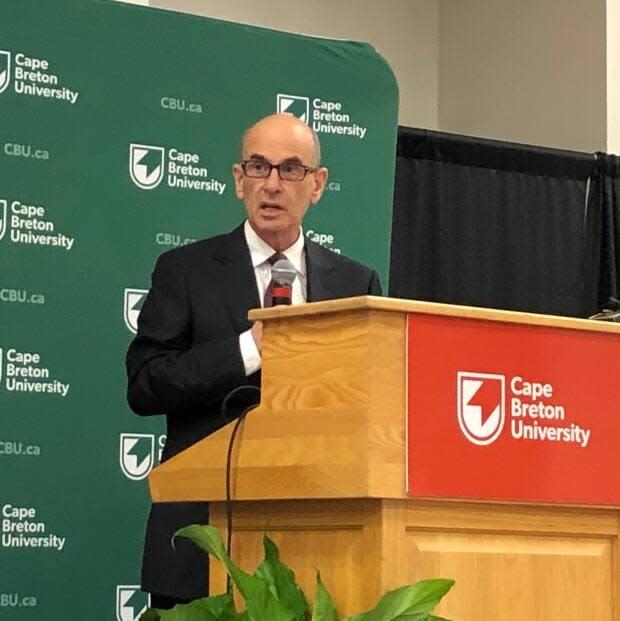CBU seeks $80M to build cutting-edge innovation centre
Cape Breton University has revealed plans for a new, $80-million Centre for Discovery and Innovation that's meant to carry the institution — and Cape Breton Island — into the future.
But the facility is contingent on funding from the provincial and federal governments that has not yet been secured, CBU president David Dingwall said Monday.
"It's all about the future," Dingwall said during a media conference at CBU, where he called on the community to lobby MLAs and other government officials to support the project.
"It's part of COVID-19 recovery. It's about going where the puck is going. It's about growing the population of Cape Breton. And it's about innovation and capturing the opportunities of the marketplace."
The proposal is to tear down a portion of the existing Arseneau-Britten science building, which is more than 50 years old, and replace it with an 80,000-square-foot, modern research and instructional facility with cutting-edge design and clean technology.

"We long ago outgrew the space," said Janice Tulk, senior researcher in the department of development. "The crumbling architecture can no longer support the demands of a growing student body."
CBU has had a huge spike in international enrolments over the past three years. In that time, the bachelor of engineering and technology program has tripled in size, said Tulk.
The new building would house rapid manufacturing and robotic labs to modernize that program. It would also have the technology and lab space needed to support CBU's growing nursing, public health and emergency management programs.
As well, the centre would be home to the Marshall Institute, which would focus its work on environmental justice and Indigenous approaches to climate change. Tulk noted the university has been consulting with the family of Donald Marshall Jr. to develop a vision for the institute.

The facility would also include a learning studio, which Tulk described as a hybrid classroom and lab space emphasizing hands-on learning and collaborative problem solving.
"Studies of these spaces at other institutions in North America show improved conceptual understanding, higher class-attendance rates, and significantly higher success rates overall — all of which improves the persistence and completion rates of students in STEM," she said.
"And this is especially important in recruiting and retaining a more diverse student population in STEM fields."
As of January 2020 — prior to the pandemic — international students were contributing $165 million to the Cape Breton economy, the university said.
"That will only grow as we attract more people internationally and as we grow our footprint," said Dingwall.
He's hoping that argument will help convince the federal and provincial governments to fund the new build.
"COVID-19 will come to an end. This is part of the recovery for the province and for eastern Nova Scotia as we move forward," he said.
"Let's take advantage of what's in the marketplace and let's proceed with some haste."
MORE TOP STORIES

